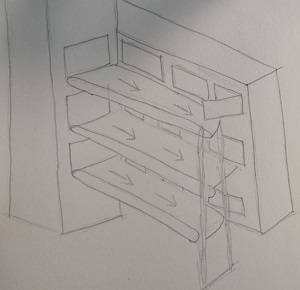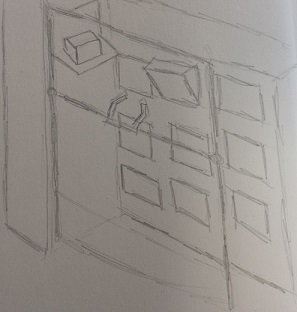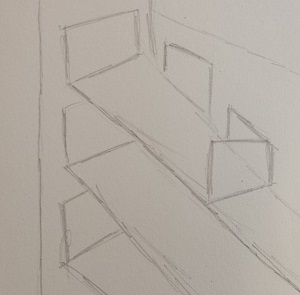Chimney to Cubby: Difference between revisions
| Line 38: | Line 38: | ||
The chimney to cubby process consists of a conveyor belt capable of transporting packages in a horizontal direction. The belt itself can move in a vertical direction. Furthermore the conveyor belt has a weight sensor to measure if there is a package on it. The cubbies consist of two doors, one for getting the package into the cubbie, and for the user to take the package out. The only doors referred to on this page are the ones used to get the package in to the cubby. The cubbies are divided into rows and each cubbie has its own number.<br> | The chimney to cubby process consists of a conveyor belt capable of transporting packages in a horizontal direction. The belt itself can move in a vertical direction. Furthermore the conveyor belt has a weight sensor to measure if there is a package on it. The cubbies consist of two doors, one for getting the package into the cubbie, and for the user to take the package out. The only doors referred to on this page are the ones used to get the package in to the cubby. The cubbies are divided into rows and each cubbie has its own number.<br> | ||
When the package is at the sliding doors, it gets scanned. The system will now know who the package is addressed to and will choose a cubby. After confirming that all the cubby doors are closed the first step will be getting the conveyor belt to it's highest position to keep the falling distance of the package to a minimal. Once the belt senses a package is on it, it will move in vertical direction to the row assigned to the package. When the conveyor belt has arrived, the system will tell the cubby to open its door about 60 degrees. The conveyor belt with the package on it will start moving until it reaches the cubby. The open door will cause the package to automatically slide into the cubby. After the system has confirmed the package has arrived, the door will close and the conveyor belt will move back to its highest position. <br> | When the package is at the sliding doors, it gets scanned. The system will now know who the package is addressed to and will choose a cubby. After confirming that all the cubby doors are closed the first step will be getting the conveyor belt to it's highest position to keep the falling distance of the package to a minimal. Once the belt senses a package is on it, it will move in vertical direction to the row assigned to the package. When the conveyor belt has arrived, the system will tell the cubby to open its door about 60 degrees. The conveyor belt with the package on it will start moving until it reaches the cubby. The open door will cause the package to automatically slide into the cubby. After the system has confirmed the package has arrived, the door will close and the conveyor belt will move back to its highest position. <br><br> | ||
Pros: | Pros: | ||
*A lot of cubbies can be reached | *A lot of cubbies can be reached | ||
Revision as of 13:41, 1 October 2014
| Project Trajectory | Project Pages | ||
|---|---|---|---|
| Home | Problem Definition | Opening | locker |
| Planning and Milestones | Background Research | Chimney | |
| Meetings | Requirements | Chimney to Cubby | |
| Design Method(s) | Brainstorm | Cubby to Person | |
| Personal Logs | Concepts Chosen | Software | |
Options
Notes:
- While the system is in the act of transporting a package, the sliding doors will not let any other package into the system.
- The system is equiped with a few sensors so that in case the package gets stuck somewhere, the system will have a good esimate of where it will be. These sensors are simple laser beams that if interrupted will send a signal, next to that the sensors that are already in use in the conveyor belt and the cubby can help locating.
Option 1
The chimney to cubby process consists of a conveyor belt capable of transporting packages in a horizontal direction. The belt itself can move in a vertical direction. Furthermore the conveyor belt has a weight sensor to measure if there is a package on it. The cubbies consist of two doors, one for getting the package into the cubbie, and for the user to take the package out. The only doors referred to on this page are the ones used to get the package in to the cubby. The cubbies are divided into rows and each cubbie has its own number.
When the package is at the sliding doors, it gets scanned. The system will now know who the package is addressed to and will choose a cubby. After confirming that all the cubby doors are closed the first step will be getting the conveyor belt to it's highest position to keep the falling distance of the package to a minimal. Once the belt senses a package is on it, it will move in vertical direction to the row assigned to the package. When the conveyor belt has arrived, the system will tell the cubby to open its door about 60 degrees. The conveyor belt with the package on it will start moving until it reaches the cubby. The open door will cause the package to automatically slide into the cubby. After the system has confirmed the package has arrived, the door will close and the conveyor belt will move back to its highest position.
Pros:
- A lot of cubbies can be reached
Cons:
- Very expensive
- Will require a lot of maintenance
- Not efficient with a high frequency of packages



